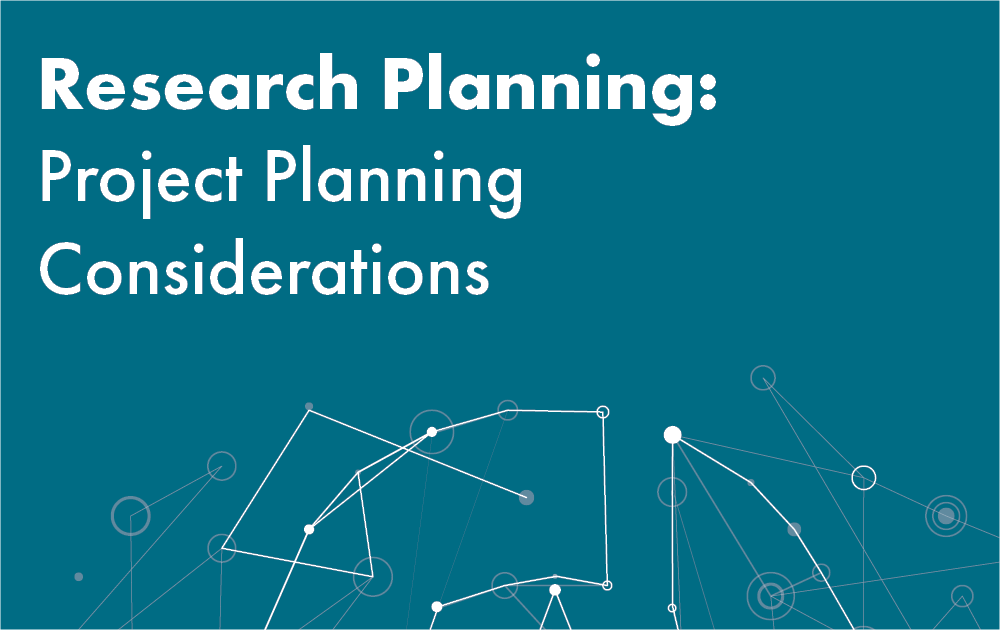5 October 2022
Part 1 — Research Planning: Project Planning Considerations
This is part 1 of 8 in the Generate a Winning Research Proposal Learning Series. Click here to download the whole series.
Project planning is an important first step in creating a robust research proposal that meets the necessary requirements, secures funding, and advances your research endeavors.
Give yourself plenty of time.
A research project often takes as long to organize, plan, and prepare for than to execute. Start by reviewing the funding opportunity announcement and the proposal templates provided by Geneva to determine how long it will take to develop the proposal – and then give yourself ample time.
Planning and discussions at the beginning stages of the project are especially important; think about whether you and your team have the time needed for these early steps. Clinical studies that may only be open and enrolling subjects for a few months can easily take a year or more to prepare to execute. Sample analysis and data analysis to generate results is another time-consuming process and dependent on the approaches being utilized. Be sure to allow for adequate time to accomplish the objectives and aims of the study within the allotted time frame.
Develop your research question and build your team.
The following questions are helpful to address when outlining your research project:
- What question(s) do you want to answer? What is the problem or gap in knowledge?
- What is known and what’s been answered thus far? Why is a solution still missing? What’s different about your solution?
- What do you think the answer might be? How do you think you can answer it?
- What methods and approach will you use? What limitations might you encounter and, given these, do you think this project is feasible?
- What resources will you need? Consider the availability of resources (collaborator’s time, access to patients, availability of patient population, facility), changes in policy, treatment guidelines and how they will affect your project.
- How long do you think it will take?
- What are the expected outcomes and do they answer the research question(s), the objective(s), and specific aims?
- What does the literature say? Based on that, what changes do you think might want to make you question your methods?
Next, think about who your core team members will be. Identify the expertise required to successfully complete your project, including co-investigators, collaborators, a statistical team, and other essential participants in departments such as physical therapy, other clinics, etc., all depending on your project area.
We recommend organizing and developing your research question with your entire team to carefully assess each of the research criteria using the FINER criteria.
Explore funding/budget considerations.*
Before beginning your funding search, be sure prepared to answer:
- How much funding is required to accomplish your project?
- Based on the funding available, is there a need to make changes to your plan, and if so, how do these changes affect other aspects of your study?
- What is the performance period of the award? Will you be able to accomplish the project in the time provided? If not, what adjustments could be made to make it feasible without affecting the validity of the results?
- Have you factored in equipment (or time on medical equipment), personnel, software expertise (contract services), sample transport, analysis, long-term plans (equipment maintenance support, specimen storage, data storage, other resources created via funding that may need maintenance)?
- What agencies might fund this project? Are the funding priorities and mission in alignment with your project idea?
- Should your research aims be adjusted to ensure a greater likelihood of award?
Make sure that your research question is exciting!
Proposal reviewers have a full-time job along with research. In addition, they’ve volunteered to support the field they’re passionate about. Make your question compelling to a reviewer and include a “methods” section in the proposal to convey your expertise. However, it is important to note that the purpose of your proposal is to demonstrate the significant value of your research and your ability to execute the project. You’ll want to attract the reviewers’ interest from the very first paragraph and make your ideas compelling enough to keep their attention.
Geneva provides comprehensive and tailored proposal development support to researchers engaged in federal grants and contracts. Click here to learn more.
Please contact research@genevaUSA.org if you have any questions regarding the content of this publication or would like to find out more information on Geneva’s research services.

HIGHLIGHTS
- Give yourself plenty of time.
- Develop your research question and build your team.
- Explore funding/budget considerations.
- Make sure that your research question is exciting!


